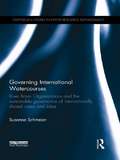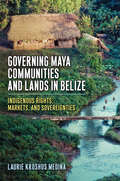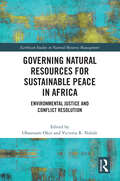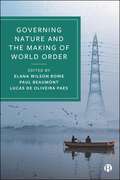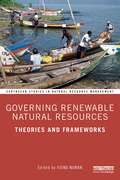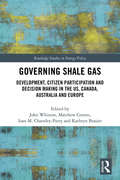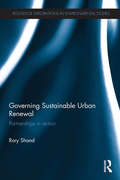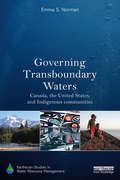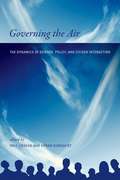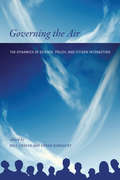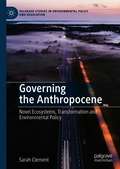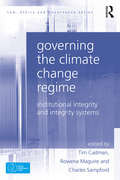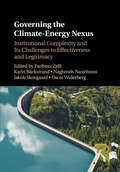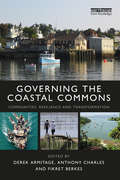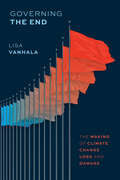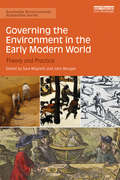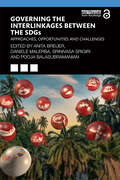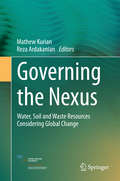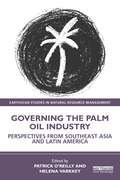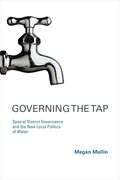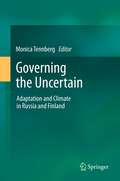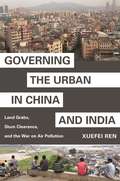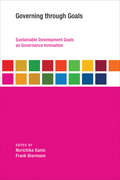- Table View
- List View
Governing International Watercourses: River Basin Organizations and the Sustainable Governance of Internationally Shared Rivers and Lakes (Earthscan Studies in Water Resource Management)
by Susanne SchmeierThis book focuses on River Basin Organizations as the key institutions for managing internationally shared water resources. This includes a comparative analysis of all River Basin Organizations worldwide and three in-depth case studies from three different continents. The detailed case studies are the Senegal (West Africa), Mekong (South-east Asia) and Danube (Europe) rivers. The book contributes to the academic debate on how shared natural and environmental resources can be managed in a sustainable way and which institutional and legal mechanisms actually matter for doing so. It adopts the neo-institutionalist approach, according to which international environmental institutions do make a difference. The analysis not only confirms this argument for the specific case of shared water resources, but also refines existing hypotheses on the influence of different independent variables, namely the nature of the collective action problem, the constellation of actors and the institutional design of an international environmental institution. The work also contributes to the policy debate on how to better govern internationally shared natural resources and the environment. It provides policy makers with advice on which exogenous conditions to be aware of when managing water resources they share with co-riparians and which institutional design features and governance mechanisms to set up in order to increase effectiveness in management.
Governing Maya Communities and Lands in Belize: Indigenous Rights, Markets, and Sovereignties
by Laurie Kroshus MedinaConfronting a debt crisis, the Belizean government has strategized to maximize revenues from lands designated as state property, privatizing lands for cash crop production and granting concessions for timber and oil extraction. Meanwhile, conservation NGOs have lobbied to establish protected areas on these lands to address a global biodiversity crisis. They promoted ecotourism as a market-based mechanism to fund both conservation and debt repayment; ecotourism also became a mechanism for governing lands and people—even state actors themselves—through the market. Mopan and Q’eqchi’ Maya communities, dispossessed of lands and livelihoods through these efforts, pursued claims for Indigenous rights to their traditional lands through Inter-American and Belizean judicial systems. This book examines the interplay of conflicting forms of governance that emerged as these strategies intersected: state performances of sovereignty over lands and people, neoliberal rule through the market, and Indigenous rights-claiming, which challenged both market logics and practices of sovereignty.
Governing Natural Resources for Sustainable Peace in Africa: Environmental Justice and Conflict Resolution (Earthscan Studies in Natural Resource Management)
by Victoria R. Nalule Obasesam OkoiThis book examines the dynamics of natural resource conflicts in Africa and explores the different governance approaches for securing sustainable peace. One of the most prominent challenges facing Africa today is the consequences of natural resource extraction. While these resources hold the potential for economic transformation across Africa, their extraction also comes with a range of environmental, social, and economic consequences, including issues related to governance. This book assembles a unique cohort of peacebuilding, environmental justice, and sustainable development scholars and practitioners from Africa and beyond to examine the dynamics of natural resource conflict and explore the governance approaches that offer pathways for sustainable peace in Africa. Drawing on case studies and empirical lessons from the Horn of Africa, Southern Africa, West Africa, East Africa, and the Central Sahel region, along with the African Union, the multidisciplinary contributors offer fresh insights into the nature of natural resource conflict in Africa, delve deeper into the complexities of natural resource governance, and highlight the interplay between resource governance and sustainable peace. By shedding light not only on Africa’s experiences and vulnerabilities but also on the challenges of natural resource governance, this book fills a crucial gap in understanding the connection between natural resource governance, conflict, and pathways for sustainable peace in Africa. Drawing on a range of disciplinary perspectives, this book will be of interest to students and scholars of natural resource governance, peace and conflict studies, environmental policy and justice, sustainable development, security studies and African studies more widely.
Governing Nature and the Making of World Order
by Elana Wilson Rowe, Paul Beaumont and Lucas de Oliveira PaesAvailable open access digitally under CC-BY-NC-ND licence. How have efforts to govern nature and address urgent global environmental challenges shaped, transformed or undermined processes of world ordering? Chapters in this book explore how efforts to govern nature have transformed – or are transforming – how we understand and practice world politics. Bringing together a team of contributors from around the world, the book traces this inquiry across diverse international policy fields, from security and peacebuilding through science cooperation and governing ecosystems to the politics of economic growth. Taken together, the book offers a conceptually ambitious and empirically grounded account of how the governance of nature and the making of world order intertwine and calls for a research agenda to attend to the growing impact of this interrelationship.
Governing Renewable Natural Resources: Theories and Frameworks (Earthscan Studies in Natural Resource Management)
by Fiona NunanIn one volume, this book brings together a diversity of approaches, theory and frameworks that can be used to analyse the governance of renewable natural resources. Renewable natural resources are under pressure, with over-exploitation and degradation raising concern globally. Understanding governance systems and practice is essential for developing effective and fair solutions. This book introduces readers to key concepts and issues concerned with the governance of renewable natural resources and illustrates the diversity of approaches, theories and frameworks that have been used to analyse governance systems and practice. Each chapter provides an introduction to an area of literature and theory and demonstrates application through a case study. The book covers a range of geographical locations, with a focus on low- and middle-income countries, and several types of natural resources. The approaches and theories introduced include common property theory, political ecology, institutional analysis, the social -ecological systems framework and social network analysis. Findings from across the chapters support an analytical focus on institutions and local context and a practical focus on diverse, flexible and inclusive governance solutions. The book serves as an essential introduction to the governance of renewable natural resources for students, researchers and practitioners.
Governing Shale Gas: Development, Citizen Participation and Decision Making in the US, Canada, Australia and Europe (Routledge Studies in Energy Policy)
by John Whitton Matthew Cotton Ioan M. Charnley-Parry Kathy BrasierShale energy development is an issue of global importance. The number of reserves globally, and their potential economic return, have increased dramatically in the past decade. Questions abound, however, about the appropriate governance systems to manage the risks of unconventional oil and gas development and the ability for citizens to engage and participate in decisions regarding these systems. Stakeholder participation is essential for the social and political legitimacy of energy extraction and production, what the industry calls a 'social license' to operate. This book attempts to bring together critical themes inherent in the energy governance literature and illustrate them through cases in multiple countries, including the US, the UK, Canada, South Africa, Germany and Poland. These themes include how multiple actors and institutions – industry, governments and regulatory bodies at all scales, communities, opposition movements, and individual landowners – have roles in developing, contesting, monitoring, and enforcing practices and regulations within unconventional oil and gas development. Overall, the book proposes a systemic, participatory, community-led approach required to achieve a form of legitimacy that allows communities to derive social priorities by a process of community visioning. This book will be of great relevance to scholars and policy-makers with an interest in shale gas development, and energy policy and governance.
Governing Sustainability
by W. Neil Adger Andrew JordanThe crisis of unsustainability is, above all else, a crisis of governance. The transition to a more sustainable world will inevitably require radical changes in the actions of all governments, and it will call for significant changes to the lifestyles of individuals everywhere. Bringing together some of the world's most highly regarded experts on governance and sustainable development, this book examines these necessary processes and consequences across a range of sectors, regions and other important areas of concern. It reveals that the governance of sustainable development is politically contested, and that it will continue to test existing governance systems to their limits. As an assessment of existing policy practices, it will be of great interest to all those who are preparing themselves - or their organisations - for the sustainability transition.
Governing Sustainable Urban Renewal: Partnerships in Action (Routledge Explorations in Environmental Studies)
by Rory ShandEnvironmental and sustainability issues are currently stretched by economic concerns and policy areas such as housing and education are therefore needed more than ever to help regenerate the social and urban environment. Governing Sustainable Urban Renewal: Partnerships in Action uses detailed case studies from the UK, Germany and USA to explore the effect of institutional design and modes of governance and evaluates policy outputs, outcomes and best practice. In doing so, it illustrates where power and decision making lies in the delivery of urban renewal initiatives and examines the roles for communities in the governance process. The analysis offers insight into the formation of partnerships and networks that can help to overcome many of the obstacles faced in urban renewal and in the promotion of sustainable development in core urban areas. Given the increasing commitment of governments throughout the world to renewal as a means for resolving entrenched environmental, social and governance problems, this timely new study should be of interest to students and researchers across a range of disciplines including environment studies, geography, public policy, governance and politics, sustainable development, planning and urban studies.
Governing Transboundary Waters: Canada, the United States, and Indigenous Communities (Earthscan Studies in Water Resource Management)
by Emma S. NormanWinner of the Political Geography Specialty Group's 2015 Julian Minghi Distinguished Book Award! With almost the entire world’s water basins crossing political borders of some kind, understanding how to cooperate with one’s neighbor is of global relevance. For Indigenous communities, whose traditional homelands may predate and challenge the current borders, and whose relationship to water sources are linked to the protection of traditional lifeways (or ‘ways of life’), transboundary water governance is deeply political. This book explores the nuances of transboundary water governance through an in-depth examination of the Canada-US border, with an emphasis on the leadership of Indigenous actors (First Nations and Native Americans). The inclusion of this "third sovereign" in the discussion of Canada-U.S. relations provides an important avenue to challenge borders as fixed, both in terms of natural resource governance and citizenship, and highlights the role of non-state actors in charting new territory in water governance. The volume widens the conversation to provide a rich analysis of the cultural politics of transboundary water governance. In this context, the book explores the issue of what makes a good up-stream neighbor and analyzes the rescaling of transboundary water governance. Through narrative, the book explores how these governance mechanisms are linked to wider issues of environmental justice, decolonization, and self-determination. To highlight the changing patterns of water governance, it focuses on six case studies that grapple with transboundary water issues at different scales and with different constructions of border politics, from the Pacific coastline to the Great Lakes.
Governing the Air
by Rolf Lidskog Goran SundqvistGoverning the Air looks at the regulation of air pollution not as a static procedure of enactment and agreement but as a dynamic process that reflects the shifting interrelationships of science, policy, and citizens. Taking transboundary air pollution in Europe as its empirical focus, the book not only assesses the particular regulation strategies that have evolved to govern European air, but also offers theoretical insights into dynamics of social order, political negotiation, and scientific practices. These dynamics are of pivotal concern today, in light of emerging international governance problems related to climate change. The contributors, all prominent social scientists specializing in international environmental governance, review earlier findings, analyze the current situation, and discuss future directions for both empirical and theoretical work. [cut last sentence in first para for catalog] The chapters discuss the institutional dimensions of international efforts to combat air pollution, examining the effectiveness of CLRTAP (Convention for Long-Range Transboundary Air Pollution) and the political complexity of the European Union; offer a broad overview and detailed case studies of the roles of science, expertise, and learning; and examine the "missing link" in air pollution policies: citizen involvement. Changing political conditions, evolving scientific knowledge, and the need for citizen engagement offer significant challenges for air pollution policy making. By focusing on process rather than product, learning rather than knowledge, and strategies rather than interests, this book gives a nuanced view of how air pollution is made governable.
Governing the Air: The Dynamics of Science, Policy, and Citizen Interaction (Politics, Science, and the Environment)
by Rolf Lidskog Goran SundqvistExperts offer theoretical and empirical analyses that view the regulation of transboundary air pollution as a dynamic process.Governing the Air looks at the regulation of air pollution not as a static procedure of enactment and agreement but as a dynamic process that reflects the shifting interrelationships of science, policy, and citizens. Taking transboundary air pollution in Europe as its empirical focus, the book not only assesses the particular regulation strategies that have evolved to govern European air, but also offers theoretical insights into dynamics of social order, political negotiation, and scientific practices. These dynamics are of pivotal concern today, in light of emerging international governance problems related to climate change. The contributors, all prominent social scientists specializing in international environmental governance, review earlier findings, analyze the current situation, and discuss future directions for both empirical and theoretical work.The chapters discuss the institutional dimensions of international efforts to combat air pollution, examining the effectiveness of CLRTAP (Convention for Long-Range Transboundary Air Pollution) and the political complexity of the European Union; offer a broad overview and detailed case studies of the roles of science, expertise, and learning; and examine the “missing link” in air pollution policies: citizen involvement.Changing political conditions, evolving scientific knowledge, and the need for citizen engagement offer significant challenges for air pollution policy making. By focusing on process rather than product, learning rather than knowledge, and strategies rather than interests, this book gives a nuanced view of how air pollution is made governable.
Governing the Anthropocene: Novel Ecosystems, Transformation and Environmental Policy (Palgrave Studies in Environmental Policy and Regulation)
by Sarah ClementThis book focuses on the present and future challenges of managing ecosystem transformation on a planet where human impacts are pervasive. In this new epoch, the Anthropocene, the already rapid rate of species loss is amplified by climate change and other stress factors, causing transformation of highly-valued landscapes. Many locations are already transforming into novel ecosystems, where new species, interactions, and ecological functions are creating landscapes unlike anything seen before. This has sparked contentious debate not just about science, but about decision-making, responsibility, fairness, and human capacity to intervene. Clement argues that the social and ecological reality of the Anthropocene requires modernised governance and policy to confront these new challenges and achieve ecological objectives. There is a real opportunity to enable society to cope with transformed ecosystems by changing governance, but this is notoriously difficult. Aimed at anyone involved in these conversations, be those researchers, practitioners, decision makers or students, this book brings together diffuse research exploring how to confront institutional change and ecological transformation in different contexts, and provides insight into how to translate governance concepts into productive pathways forward.
Governing the Climate
by Johannes Stripple Harriet BulkeleyDespite a growing interest in critical social and political studies of climate change, the field remains fragmented and diffuse. This is the first volume to collect this body of scholarship, providing a key reference point in the growing debate about climate change across the social sciences. The book provides a new set of insights into the ways in which climate change is creating new forms of social order, and the ways in which they are structured through the workings of rationality, power and politics. Governing the Climate is invaluable for three main audiences: social science researchers and advanced students in the field of climate change; the wider research community interested in global environmental politics and global environmental governance; and policy makers and researchers concerned more broadly with environmental politics at international, national and local levels.
Governing the Climate Change Regime: Institutional Integrity and Integrity Systems (Law, Ethics and Governance)
by Tim Cadman Rowena Maguire Charles SampfordThis volume, the second in a series of three, examines the institutional architecture underpinning the global climate integrity system. This system comprises an inter-related set of institutions, governance arrangements, regulations, norms and practices that aim to implement the United Nations Framework Convention on Climate Change (UNFCCC). Arguing that governance is a neutral term to describe the structures and processes that coordinate climate action, the book presents a continuum of governance values from ‘thick’ to ‘thin’ to determine the regime’s legitimacy and integrity. The collection contains four parts with part one exploring the links between governance and integrity, part two containing chapters which evaluate climate governance arrangements, part three exploring avenues for improving climate governance and part four reflecting on the road to the UNFCCC's Paris Agreement. The book provides new insights into understanding how systemic institutional and governance failures have occurred, how they could occur again in the same or different form and how these failures impact on the integrity of the UNFCCC. This work extends contemporary governance scholarship to explore the extent to which selected institutional case studies, thematic areas and policy approaches contribute to the overall integrity of the regime.
Governing the Climate-Energy Nexus: Challenges to Coherence, Legitimacy and Effectiveness
by Fariborz Zelli Jakob Skovgaard Karin Bäckstrand Naghmeh Nasiritousi Oscar WiderbergCombating climate change and transitioning to fossil-free energy are two central and interdependent challenges facing humanity today. Governing the nexus of these challenges is complex, and includes multiple intergovernmental and transnational institutions. This book analyses the governance interactions between such institutions, and explores their consequences for legitimacy and effectiveness. Using a novel analytical framework, the contributors examine three policy fields: renewable energy, fossil fuel subsidy reform, and carbon pricing. These fields are compared in terms of their institutional memberships, governance functions and overarching norms. Bringing together prominent researchers from political science and international relations, the book offers an essential resource for future research and provides policy recommendations for effective and legitimate governance of the climate-energy nexus. Rooted in the most recent research, it is an invaluable reference for researchers, policymakers and other stakeholders in climate change and energy politics.
Governing the Coastal Commons: Communities, Resilience and Transformation (Earthscan Oceans)
by Anthony Charles Fikret Berkes Derek ArmitageCoastal communities depend on the marine environment for their livelihoods, but the common property nature of marine resources poses major challenges for the governance of such resources. Through detailed cases and consideration of broader global trends, this volume examines how coastal communities are adapting to environmental change, and the attributes of governance that foster deliberate transformations and help to build resilience of social and ecological systems. Governance here reflects how communities, societies and organisations (e.g. fisher cooperatives, government agencies) choose to organise themselves to make decisions about important issues, such as the use and protection of coastal commons (e.g. fishery resources). The book shows how a governance approach generates insights into the specific forms and arrangements that enable coastal communities to steer away from unsustainable pathways. It also provides an analytical lens to consider important questions of power, knowledge and legitimacy in linked social-ecological systems. Chapters highlight examples in which communities are engaging in deliberative transformations to build resilience and enhance their well-being. These transformations and efforts to build resilience are emerging through multi-level collaboration, shared learning, innovative policies and institutional arrangements (such as new property rights regimes and co-management), methodologies that engage with indigenous cultural practices, and entrepreneurial activities, including income and livelihood diversification. Case studies are included from a range of countries including Canada, Japan, Brazil, Indonesia, Mexico, South Africa, Thailand, the South Pacific and Europe. The authors integrate theory with practical examples to improve coastal marine policy and governance, and draw upon emerging concepts from social-ecological resilience and transformations, adaptive governance and the scholarship on the commons.
Governing the End: The Making of Climate Change Loss and Damage (Chicago Series in Law and Society)
by Lisa VanhalaA searing account of how the international community is trying—and failing—to address the worst effects of climate change and the differential burdens borne by rich and poor countries. Climate change is increasingly accepted as a global emergency creating irrevocable losses for the planet. Yet, each country experiences these losses differently, and reaching even inadequate political agreements is fraught with contestation. Governing the End untangles the complex relationship between deteriorating environmental conditions, high politics, and everyday diplomatic practices, focusing on the United Nations’ agreement to address “loss and damage” and subsequent battles over implementation. Lisa Vanhala looks at the differing assumptions and strategic framings that poor and rich countries bring to bear and asks why some norms emerge and diffuse while others fail to do so. Governing the End is based on ethnographic observation of eight years of UN meetings and negotiations and more than one hundred and fifty interviews with diplomats, policymakers, UN secretariat staff, experts, and activists. It explores explicit political contestation, as well as the more clandestine politics that have stymied implementation and substantially reduced the scope of compensation to poor countries. In doing so, Governing the End elucidates the successes and failures of international climate governance, revealing the importance of how ideas are constructed and then institutionally embodied.
Governing the Environment in the Early Modern World: Theory and Practice (Routledge Environmental Humanities)
by John Morgan Sara MigliettiThroughout the early modern period, scientific debate and governmental action became increasingly preoccupied with the environment, generating discussion across Europe and the wider world as to how to improve land and climate for human benefit. This discourse eventually promoted the reconsideration of long-held beliefs about the role of climate in upholding the social order, driving economies and affecting public health. Governing the Environment in the Early Modern World explores the relationship between cultural perceptions of the environment and practical attempts at environmental regulation and change between 1500 and 1800. Taking a cultural and intellectual approach to early modern environmental governance, this edited collection combines an interpretative perspective with new insights into a period largely unfamiliar to environmental historians. Using a rich and multifaceted narrative, this book offers an understanding as to how efforts to enhance productive aspects of the environment were both led by and contributed to new conceptualisations of the role of ‘nature’ in human society. This book offers a cultural and intellectual approach to early modern environmental history and will be of special interest to environmental, cultural and intellectual historians, as well as anyone with an interest in the culture and politics of environmental governance.
Governing the Interlinkages between the SDGs: Approaches, Opportunities and Challenges
by Anita Breuer Daniele Malerba Srinivasa Srigiri Pooja BalasubramanianGoverning the Interlinkages between the SDGs: Approaches, Opportunities and Challenges identifies the institutional processes, governance mechanisms and policy mixes that are conducive to devising strategies of integrated Sustainable Development Goal (SDG) implementation. The book edited by Anita Breuer, Daniele Malerba, Srinivasa Srigiri and Pooja Balasubramanian examines the dedicated policies targeting the SDGs, as well as political and institutional drivers of synergies and trade-offs between the SDGs in selected key areas – both cross-nationally and in specific country contexts. Their analysis moves beyond the focus on links between SDG indicators and targets. Instead, the book takes advantage of recent evidence from the initial implementation phase of the SDGs and each chapter explores the question of which political-institutional prerequisites, governance mechanisms and policy instruments are suited to accelerate the implementation of the SDGs. The findings presented are intended to both inform high-level policy debates and to provide orientation for practitioners working on development cooperation. This volume will be of great interest to practitioners and policy makers in the field of sustainable development, as well as academics in the fields of sustainability research, political science, and economics.
Governing the Nexus
by Mathew Kurian Reza ArdakanianGlobal trends such as urbanization, demographic and climate change that are currently underway pose serious challenges to sustainable development and integrated resources management. The complex relations between demands, resource availability and quality and financial and physical constraints can be addressed by knowledge based policies and reform of professional practice. The nexus approach recognizes the urgent need for this knowledge and its interpretation in a policy- relevant setting that is guided by the understanding that there is a lack of blueprints for development based on integrated management of water, soil and waste resources in the Member States. Generation and application of knowledge is both a priority for individual but also institutional capacity development.
Governing the Palm Oil Industry: Perspectives from Southeast Asia and Latin America (ISSN)
by Helena Varkkey Patrick O’ReillyThis book examines how different countries across Southeast Asia and Latin America respond to the emergence and expansion of the lucrative, yet controversial palm oil industry, paying attention to how national policy and governance regimes are shaping this global industry.With its historic roots in Southeast Asia, oil palm cultivation continues to expand beyond its historical centres. In Latin America, many countries are now developing their own policies to promote and govern oil palm cultivation. This book provides a unique examination of how different countries strive to strike a balance between developmental and environmental concerns, through case studies on Indonesia, Malaysia, the Philippines, Thailand, Colombia, Brazil, Ecuador, Honduras, and Mexico, and an outlook for the industry's prospects in Africa. This book applies an assemblage approach to draw out lessons on the global challenges posed by the industry and how differing national governance regimes and communities might respond to them. Rather than a single global industry, the book unveils a complex arrangement of national and even local palm oil assemblages, indicating that there is more than one way to do palm oil. In doing so, the book contributes to a better understanding of the drivers and processes that shape the governance of the industry, both in different nations and globally.This book will be of great interest to students and scholars of the palm oil industry, as well as those interested in natural resource governance, sustainable agriculture, conservation, environmental justice, and environmental and development policy more broadly.
Governing the Tap: Special District Governance and the New Local Politics of Water (American and Comparative Environmental Policy)
by Megan MullinAn analysis of the political consequences of special district governance in drinking water management that offers new insights into the influence of political structures on local policymaking.More than ever, Americans rely on independent special districts to provide public services. The special district—which can be as small as a low-budget mosquito abatement district or as vast as the Port Authority of New York and New Jersey—has become the most common form of local governance in the United States. In Governing the Tap, Megan Mullin examines the consequences of specialization and the fragmentation of policymaking authority through the lens of local drinking-water policy. Directly comparing specific conservation, land use, and contracting policies enacted by different forms of local government, Mullin investigates the capacity of special districts to engage in responsive and collaborative decision making that promotes sustainable use of water resources. She concludes that the effect of specialization is conditional on the structure of institutions and the severity of the policy problem, with specialization offering the most benefit on policy problems that are least severe. Mullin presents a political theory of specialized governance that is relevant to any of the variety of functions special districts perform. Governing the Tap offers not only the first study of how the new decentralized politics of water is taking shape in American communities, but also new and important findings about the influence of institutional structures on local policymaking.
Governing the Uncertain
by Monica TennbergThe book provides a detailed analysis of the development of adaptive governance in Russia and Finland. It presents a case study from the Sakha Republic in Russia that focuses on community's participation in the process of governing of the flood events in the Tatta River area. Local adaptive practices are analyzed in relation to federal and regional responses that may mandate, encourage or collide with community's agency. A second case study is centered on the Finnish community of Kuttura, Ivalo. It explores the mounting challenges presented by changing environmental conditions to traditional reindeer herding, as well as the efforts made to cope with these new factors. Combining anthropological research and political science, this penetrating work offers revealing scrutiny of governmental responses to one of the most urgent issues facing both politicians and the citizens who live in their domains.
Governing the Urban in China and India: Land Grabs, Slum Clearance, and the War on Air Pollution (Princeton Studies in Contemporary China #10)
by Xuefei RenAn in-depth look at the distinctly different ways that China and India govern their cities and how this impacts their residentsUrbanization is rapidly overtaking China and India, the two most populous countries in the world. One-sixth of humanity now lives in either a Chinese or Indian city. This transformation has unleashed enormous pressures on land use, housing, and the environment. Despite the stakes, the workings of urban governance in China and India remain obscure and poorly understood.In this book, Xuefei Ren explores how China and India govern their cities and how their different styles of governance produce inequality and exclusion. Drawing upon historical-comparative analyses and extensive fieldwork (in Beijing, Guangzhou, Wukan, Delhi, Mumbai, and Kolkata), Ren investigates the ways that Chinese and Indian cities manage land acquisition, slum clearance, and air pollution. She discovers that the two countries address these issues through radically different approaches. In China, urban governance centers on territorial institutions, such as hukou and the cadre evaluation system. In India, urban governance centers on associational politics, encompassing contingent alliances formed among state actors, the private sector, and civil society groups. Ren traces the origins of territorial and associational forms of governance to late imperial China and precolonial India. She then shows how these forms have evolved to shape urban growth and residents’ struggles today.As the number of urban residents in China and India reaches beyond a billion, Governing the Urban in China and India makes clear that the development of cities in these two nations will have profound consequences well beyond their borders.
Governing through Goals: Sustainable Development Goals as Governance Innovation (Earth System Governance)
by Frank Biermann Norichika KanieA detailed examination of the UN's Sustainable Development Goals and the shift in governance strategy they represent.In September 2015, the United Nations General Assembly adopted the Sustainable Development Goals as part of the 2030 Agenda for Sustainable Development. The Sustainable Development Goals built on and broadened the earlier Millennium Development Goals, but they also signaled a larger shift in governance strategies. The seventeen goals add detailed content to the concept of sustainable development, identify specific targets for each goal, and help frame a broader, more coherent, and transformative 2030 agenda. The Sustainable Development Goals aim to build a universal, integrated framework for action that reflects the economic, social, and planetary complexities of the twenty-first century. This book examines in detail the core characteristics of goal setting, asking when it is an appropriate governance strategy and how it differs from other approaches; analyzes the conditions under which a goal-oriented agenda can enable progress toward desired ends; and considers the practical challenges in implementation.ContributorsDora Almassy, Steinar Andresen, Noura Bakkour, Steven Bernstein, Frank Biermann, Thierry Giordano, Aarti Gupta, Joyeeta Gupta, Peter M. Haas, Masahiko Iguchi, Norichika Kanie, Rakhyun E. Kim Marcel Kok, Kanako Morita, Måns Nilsson, László Pintér, Michelle Scobie, Noriko Shimizu, Casey Stevens, Arild Underdal, Tancrède Voituriez, Takahiro Yamada, Oran R. Young
